Christ’s sufferings and death are a past event. When He rose from the dead, they ended. We know that the effects of His death carry forward to today just as they carried back to the sins God had “passed over” prior to Christ’s death (Rom. 3:25). His suffering and death also affect Him now.
“He is a merciful and faithful high priest in things facing God, to propitiation regarding the sins of the people. For in which He suffered, He is able to respond to the cry of help for those being tempted” (Heb. 2:17-18). He experienced the things we experience. God cannot be tempted with evil (Jas. 1:13). So the Son became man to experience our struggle. In this way, He has mercy towards us in our struggles, our pain, and our temptations. Mercy is His pity on suffering as a result of sin, whether our immediate sin, the sin of Adam that affects us all, or another’s sin against us. The verb “propitiate” is in the Greek present tense indicating that He continues to be the satisfaction for our sins (cp 1 Jh. 2:1-2). The words “He has suffered” are in the Greek perfect tense indicating a past act with continuing results or a result. The participle “being tempted” describes the specific area of suffering. When believers are tempted, and Jesus was also tempted, the past suffering is real to Him and He does not stand aloof from our struggle. We see a version of this in people relating to and helping others who are going through something that they at one time experienced. We all can help others even when we haven’t gone through their experience, but there is a unique perspective among those with a shared experience. So, Jesus’ past experiences have an effect on Him in His human nature, glorified human nature, but still human.
Jesus’ prayers for us
Before Jesus left the upper room, He spoke to the Father about His disciples. “I ask on their behalf; I do not ask on behalf of the world, but of those whom You have given Me; for they are Yours;” (Jh. 17:9). He did not ask for the Father to take them out of the world, but to keep them from the evil one (17:15). He sent them into the world recognizing how hard it would be and warning them of what was to come for them. He did not ask the Father to keep them from hardships or pain. He had faced both, and in human nature, He learned obedience and matured through suffering (Heb. 5:7-9). As our high priest, does He then ask for us to escape suffering and hardship? He didn’t Himself. His intercession for us is not escape but strength (spiritual/mental) to go through that suffering.
As an aside, these facts need to be taught in our churches. Too many churches present Christ and salvation as believe in Him, come join, and have the best life ever. We try to sell people on Christianity being fun, fun, fun. Christianity is fulfilling with the right mindset. Peter and John could leave the Jewish council after being beaten and go away rejoicing that they were counted worthy to suffer for Christ. I can’t imagine the early church ever misrepresented the gospel or taught new believers about the best life ever in terms of fun and material prosperity.

Jesus’ prayers in Gethsemane
In the garden of Gethsemane, Jesus prayed to the Father about His coming sufferings. His hour was that stretch of time during which He the Creator submitted to Himself to the creation, even allowing them to mistreat Him, mock Him, and put Him on a cross. He also prayed to the Father about the CUP. “My Father, IF it is possible, let this cup pass from Me; yet not as I will, but as You desire.” (Mt. 26:39). The “if” with the verb “is” in this statement form a FIRST CLASS CONDITION, a statement that assumes the first part of the condition to be true. Rephrased, Jesus’ request reads, “Since it is possible…” The Old Testament anticipated redemption through suffering. John the Baptist and Jesus spoke of Jesus providing a redemption and bearing sin. So, was Jesus saying that God’s purpose could be accomplished without Jesus dying? Hebrews 5:7 corrects the common misconception that Jesus was asking to avoid death, “Who, in the days of His flesh having offered, with strong cries and tears both supplications and pleadings to the one being able to save Him out of death and being heard, because of His God-honoring actions.” Note, that the writer says Jesus asked to be saved “out of death” not “from death.” Jesus knew He was going to die. He had prophesied His death. But in His human nature, He did not know how long that death would be. “WAIT,” you say, “He said He would rise in three days.” Indeed. We think only of His physical death, but from noon until three, Jesus experienced spiritual death, separation from the Father and the Spirit. This is the death about which He asked. He did not know how long that death would last. Hebrews 5:7 states that He was heard, meaning the Father did end that spiritual death before His physical death. Yet not knowing the extent of that death, Jesus willingly faced that death. In this same way, He intercedes for us. He sympathizes with our weakness and we can receive mercy and find grace for our cry for help that is well-timed (Heb. 4:14-16).
Jesus’ example for suffering
On the cross, Jesus responded to others in silence. He left us an example of how we can suffer (1 Pet. 2:21-23). Human nature responds to others in kind. If they treat us well, we treat them well. If they insult us, we tend to insult in return. Jesus spoke no threats. We are reminded of His words, as the soldiers nailed Him to the cross, “Father, forgive them. They do not know what they are doing.” (Lk. 23:34). Many modern Christians need to learn this lesson as we have become quite vitriolic in our reaction to the world, a very non-Christian, non-Biblical response. Christ entrusted Himself to God, who judges righteously. The centurion, the Roman soldier who was likely in charge of the others at the crucifixion, when he observed all these things and how Jesus breathed His last, he glorified God and said, “Truly this man was God’s Son.” (Mt. 27:54; Mk. 15:39; Lk. 23:47). An unbelieving Romans soldier saw a difference in Jesus Christ and it impacted Him. We’d like to believe that he became a believer.
Jesus’ suffering for our freedom
Christ’s suffering is also a call for us to experience freedom from sin’s dominion. Christ suffered in flesh, and we should equip ourselves with the same intent, to cease from sin (1 Pet. 4:1). Christ was sinless, the unblemished and spotless lamb of God (1:19). He did not have to cease sinning because He never sinned. Yet His death dealt not only with our guilt under sin but of sin’s dominion. We are no longer enslaved to sin. Peter is referring specifically to our sin nature, also designated as the flesh. This can be seen in some of the areas of sin Peter refers to in 4:3, acts which are also mentioned among the works of the flesh (Gal. 5:19-21). Suffering can sometimes result in our excusing sin because we think we already have it so bad. Referencing Christ’s suffering, Peter points out the fallacy of such thinking. As Paul said, we were put into Christ’s death and should count ourselves to be dead ones to that sin nature, but living ones to God in Christ Jesus (Rom. 6:3-4, 11). Christ’s suffering and death mean our freedom today.
Many believers have experienced this comfort through the centuries, not by Christ granting us escape from our pain, temptation, and hardships, but by asking the Father for our growth through hardship (Heb. 7:25).








